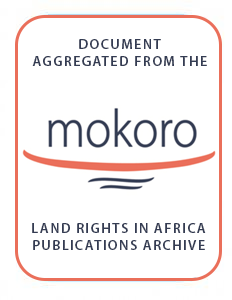Location
Mokoro is pleased to host the ’Land Rights in Africa’ site as a contribution to the land rights dialogue and related debates. This website was created in January 2000 by Robin Palmer, and was originally housed by Oxfam GB, where Robin worked as a Land Rights Adviser. A library of resources on land rights in Africa – with a particular focus on women’s land rights and on the impact of land grabbing in Africa – the portal has been well received by practitioners, researchers and policy makers, and has grown considerably over the years. Since 2012, Mokoro has been hosting and maintaining the site.
The views expressed on the Land Rights in Africa site as well as the publications hosted there, are those of the authors and do not represent those of Mokoro. Wherever possible, we link to the source website of publications.
Members:
Resources
Displaying 791 - 795 of 1134Challenges Facing the Implementation of the Forest Act 2005
Contains sections on challenges facing the implementation of the Forest Act 2005; the new Forest Act and community involvement; CSOs and the new Act; forest evictions and excision – views of a section of stakeholders; Likia forest evictees – a forgotten lot; the Maasai Mau Forest – a story of confusion and desperation; excision of forest lands by Government continues; what is the true status of the draft National Land Policy?
More than simply ‘socially embedded’: recognizing the distinctiveness of African land rights
Discusses controversies generated by recent South African legislation (the Communal Land Rights Act), shows how these echo debates in the wider African context, and explores potential solutions to reform of ‘customary’ land tenure regimes. Argues that the most appropriate approach to tenure reform is to make socially legitimate occupation and use rights the point of departure for both their recognition in law and for the design of institutional contexts for mediating competing claims and administering land.
Changes in the Livestock Sector in Zimbabwe following Land Reform: The Case of Masvingo Province. A Report of a Discussion Workshop
Workshop report draws on a larger research report examining the massively changed context for livestock policy following fast track land reform. Themes discussed were production, grazing, fodder and drought responses, marketing, livestock disease and veterinary services.
Land Tenure in Post FTLRP Zimbabwe: Key Strategic Policy Development Issues
Provides an overview of key political, economic and strategic policy development options for the consolidation of land tenure policies and strengthened property rights and tenure security in Zimbabwe following land reform.
Gender Monitoring Baseline Survey for the Land Sector Strategic Plan in 20 Districts
Baseline survey which includes a literature review. Findings cover land and livelihoods, land ownership and security of tenure, land rights and decision making, land market and transactions, land disputes. Concludes that the volume of land transactions is too low to support a transformation from subsistence to commercial agriculture, as planned. Smallholder farmers have limited capital options making increased land utilization impossible. Tenure security for women is still far from a reality. There is a need to strengthen land rights of widows and orphans.




